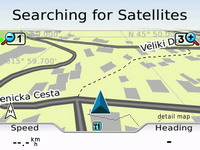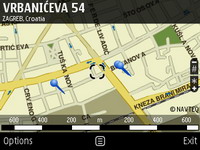Orientation, Navigation, Geolocation!
 I was not so good at geography at school, but I always liked maps. Especially the old vintage antique ones, and sea maps. Also, I like to travel and I think of my self as one of those people who can easily orientate in space (although I could never imagine my self navigating a sea ship at stormy night using nothing but sextant). Going to place you have never been before – be it a new continent, a street in foreign city or a dirt road leading to an gourmet restaurant in Istria is always a challenge.
I was not so good at geography at school, but I always liked maps. Especially the old vintage antique ones, and sea maps. Also, I like to travel and I think of my self as one of those people who can easily orientate in space (although I could never imagine my self navigating a sea ship at stormy night using nothing but sextant). Going to place you have never been before – be it a new continent, a street in foreign city or a dirt road leading to an gourmet restaurant in Istria is always a challenge.
The challenge which by little help of modern marvel becomes a walk in the park. Originally developed by US Dept. of Defense, GPS and can now be found in cameras, phones even arm watches. My trusty Garmin nüvi 760 packed with maps of Europe and best set of maps for our region – AdriaRoute and SCG ROUTE never let me down so far. Even my last phone Noka E71 is A-GPS enabled device. Nokia Maps (or Yahoo Maps and Google Maps for that matter) have really bad coverage of streets in Croatia so are basically useless for navigation. But Garmin Mobile XT runs on Symbian very well and you can use the same maps as mentioned above. Since my mobile phone is internet enabled too, with the help of GPS device the possibilities for navigation and orientation are practically limitless. Right? Right?
Wrong. Why? Because browser (Opera Mini) and Flash Lite 3 can’t communicate with GPS device. Actually Flash Lite can communicate with GPS trough KunerLite S60 RAD, and Opera Mobile (because it supports javascript) can communicate with GPS trough similar expensive middle-ware called GPSGate, but all that is far far away from becoming a standard.
 Good news is that couple of days ago Mozilla Labs released experimental geolocating plug-in for Firefox called Geode which would help websites locate you. All that conforming to the W3C Geolocation specification. Beta plugin uses single hard-coded location provider (utilizing proprietary Skyhook’s Loki technology) to map your local Wifi hotspot or cell towers GPS location in your area to your location. If this started to freak you out, fear not – users can decide what level of location information they want to reveal to a website, ‘exact location’, ‘neighborhood’, ‘city’ or ‘nothing’. None of this obviously doesn’t work in Croatia so it’s NOTHING by default for us. If you are reading this from other part of the universe – check the demo here.
Good news is that couple of days ago Mozilla Labs released experimental geolocating plug-in for Firefox called Geode which would help websites locate you. All that conforming to the W3C Geolocation specification. Beta plugin uses single hard-coded location provider (utilizing proprietary Skyhook’s Loki technology) to map your local Wifi hotspot or cell towers GPS location in your area to your location. If this started to freak you out, fear not – users can decide what level of location information they want to reveal to a website, ‘exact location’, ‘neighborhood’, ‘city’ or ‘nothing’. None of this obviously doesn’t work in Croatia so it’s NOTHING by default for us. If you are reading this from other part of the universe – check the demo here.
Mozilla says that in final version location will be provided by one or more user selectable service providers and methods, e.g. GPS-based, WiFi-based, ip2location, manual entry, etc. What is even more interesting is that this plugin will be in core of the upcoming beta releases of Firefox 3.1, as well as alpha releases of Fennec (Mobile Firefox).
This is pretty good damn news from Mozilla because proprietary solutions like Skyhook’s XPS or Garmin Communicator (plugin which enables your browser to talk to Garmin GPS) don’t provide enough user coverage for worldwide usage.
When I touched standards, it have to mention a new standard proposed to IETF this year called HTTP Enabled Location Delivery (HELD) which proposes a standardized way to ask the network (Location Information Server (LIS)) for the location of the device. This is still a proposal, and years away from worldwide implementation, but if nothing, I at least expect Jack Bauer to catch criminals by “hacking the HELD” in new season of 24. :)
 Garmin Mobile XT |
 Nokia Maps |

